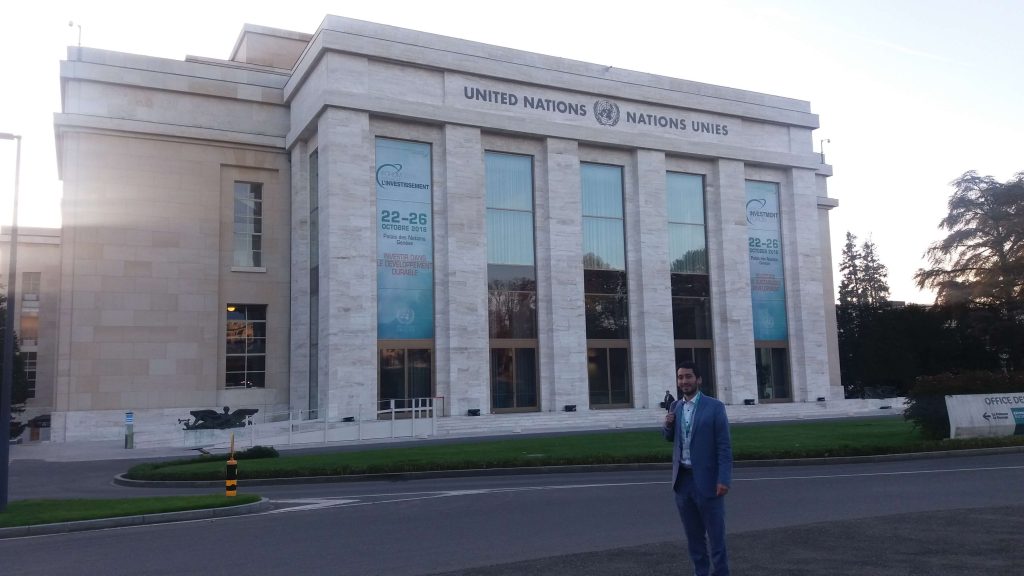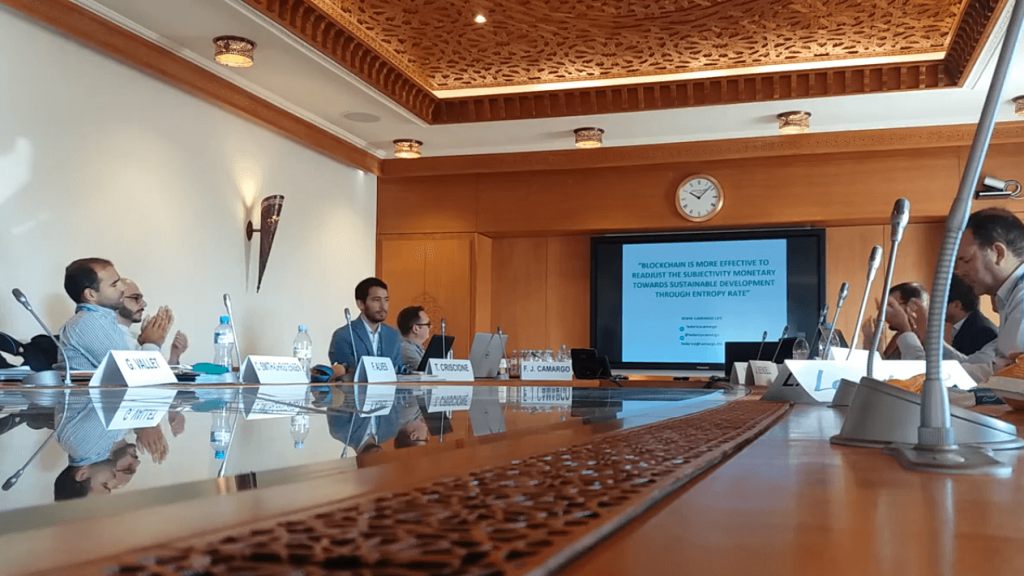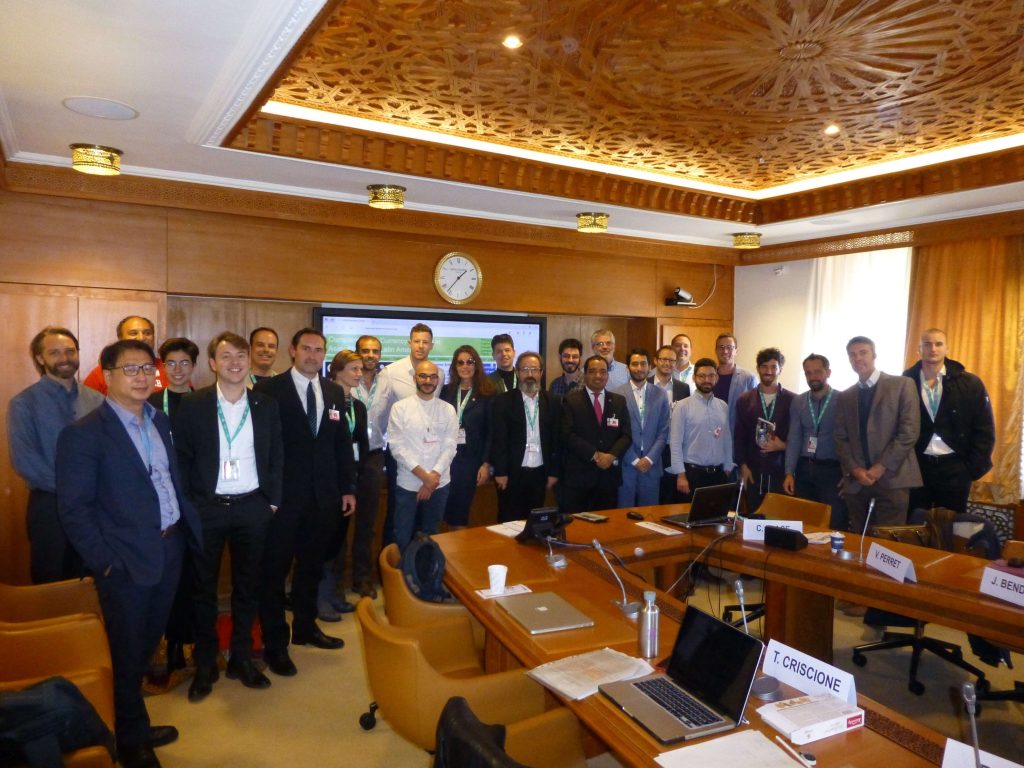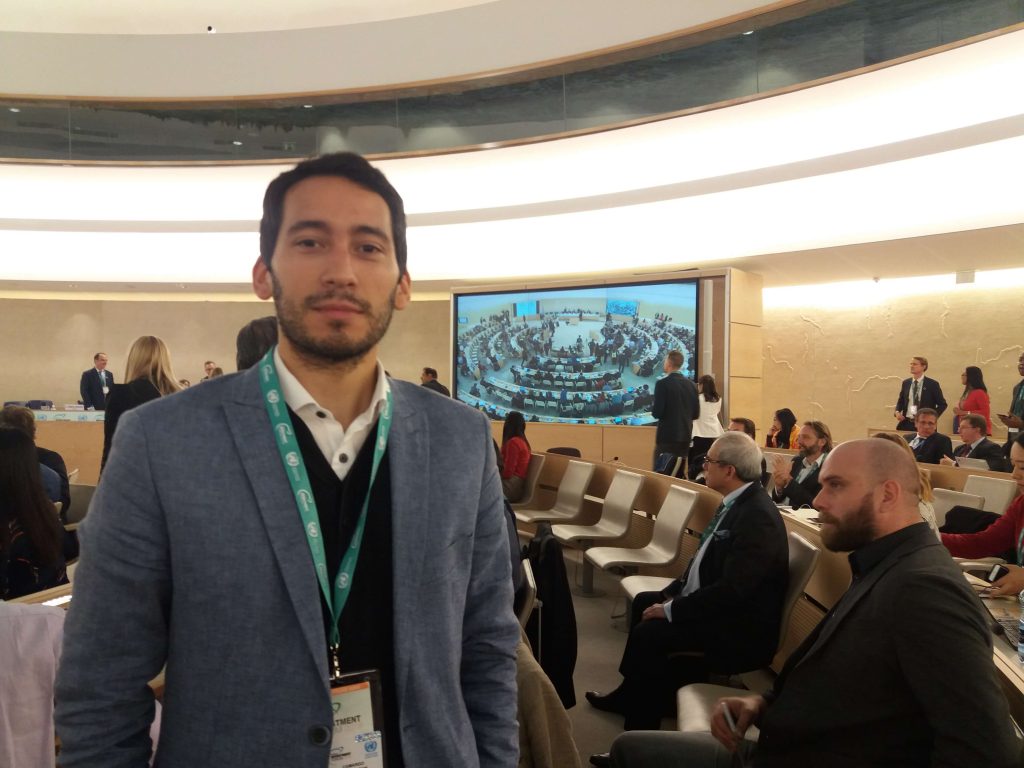Exposición de Blockchain para el Desarrollo Sostenible en Simposio de Innovación Monetaria y Monedas Complementarias en las Naciones Unidas
Tuve el placer de participar en el evento Blockchain para el Desarrollo Sostenible (B4SD) y de exponer en el Simposio de Investigadores en Innovación Monetaria y Monedas Complementarias en las Naciones Unidas, en Ginebra, Suiza.

Blockchain para el Desarrollo Sostenible: Simposio de Innovación Monetaria y Monedas Complementarias en las Naciones Unidas
El Simposio de Innovación Monetaria y Monedas Complementarias fue co-organizado por el Instituto de Investigación de las Naciones Unidas para el Desarrollo Social (UNRISD), la Asociación de Investigación sobre Innovación Monetaria y Sistemas Monetarios Comunitarios y Complementarios (RAMICS), el Instituto para el Liderazgo y la Sostenibilidad (IFLAS), Blockchain para el Desarrollo Sustentable (B4SD.net) y la Confederación Monetaria Suiza (SCC), en el marco del Foro Mundial de Inversiones (WIF) el 25 de Octubre del 2018 en el Palacio de las Naciones en Ginebra, Suiza.
La apertura del Simposio estuvo a cargo Paul Ladd (UNRISD), Jem Bendell (IFLAS), Filipe Alves (RAMICS), Teodoro Criscione (RAMICS), Christophe Place (SCC) y Virgile Perret (SCC).
Las exposiciones se diagramaron en Teoría Monetaria y Sostenibilidad; Iniciativas Monetarias Virtuales, Digitales y Criptográficas; y Sistemas Monetarios en el Mundo. A continuación, el título y el resumen de mi ponencia.
LA EFECTIVIDAD DE LA TECNOLOGÍA BLOCKCHAIN PARA REAJUSTAR LA SUBJETIVIDAD DE LOS SISTEMAS MONETARIOS HACIA EL DESARROLLO SOSTENIBLE

Resumen de la ponencia
El desarrollo sustentable implica estudiar y comprender el funcionamiento del ambiente a fin de ajustar y readaptar la subjetividad que el ser humano implementó a través de sus universos culturales simbólicos. En este caso de estudio: el sistema monetario.
Las diversas innovaciones tecnológicas permiten soñar con avanzar hacia el desarrollo sustentable, por tal motivo, se pretende demostrar la efectividad de la tecnología Blockchain para ajustar el sistema monetario a la Ley de la Entropía por el transcurso irreversible del tiempo frente a la tecnología que utiliza el sistema bancario tradicional.
Mediante un enfoque teórico se comparó la esencia del impacto por la implementación de una tasa entrópica, basado en la concepción de oxidación de Silvio Gesell, en las tecnologías consideradas.
El resultado de la investigación demuestra que la tecnología Blockchain es más efectiva a fin de implementar una tasa entrópica, en línea a la economía ecológica, que permita reajustar la subjetividad del sistema monetario hacia el funcionamiento entrópico del ambiente.
Abstract
Sustainable development involves studying and understanding the functioning of the environment in order to adjust and readapt the subjectivity that human beings implemented through their symbolic cultural universes. In this case study: the monetary system.
The various technological innovations allow us to dream of moving towards sustainable development, for this reason, it is intended to demonstrate the effectiveness of the Blockchain technology to adjust the monetary system to the Law of Entropy by the irreversible course of time in front of the technology that uses the traditional banking system.
Through a theoretical approach, the essence of the impact was compared by the implementation of an entropic rate, based on the conception of oxidation of Silvio Gesell, in the technologies considered.
The result of the research shows that the Blockchain technology is more effective in order to implement an entropic rate, in line with the ecological economy, which allows to readjust the subjectivity of the monetary system towards the entropic functioning of the environment.

Agradezco a Dr. Jem Bendell, Stephen DeMeulenaere y Mag. Christophe Place por el éxito del evento, y por todo el esfuerzo realizado antes, durante y después del Simposio.
Para mayor información sobre el Simposio ingresar en: UNRISD, RAMICS, IFLAS o B4SD.NET.
Blockchain para el Desarrollo Sostenible Blockchain for Sustainable Development
Blockchain para el Desarrollo Sostenible (B4SD) fue co-organizado por las Naciones Unidas, el Instituto para el Liderazgo y la Sostenibilidad (IFLAS) y la Universidad de Cumbria, en el marco del Foro Mundial de Inversiones (WIF) el día 24 de Octubre del 2018 en el Palacio de las Naciones en Ginebra, Suiza.

El objetivo principal de Blockchain para el Desarrollo Sostenible fue debatir sobre
*La aplicación de las tecnologías blockchain en las empresas y las finanzas.
*Los riesgos y oportunidades de blockchain para el desarrollo sostenible.
*Antecedentes normativos y normativos, inquietudes y respuestas.
La apertura estuvo a cargo del profesor Jem Bendell, quién expresó que recuerdo que me miraban como un loco cuando estaba en Davos en hablando sobre oportunidades de #blockchain. Seis años después, aquí estamos en la Naciones Unidas. Puede que todavía parezca un lunático para algunos, pero al menos tengo una multitud más grande.
I remember being looked at like a lunatic when I was in Davos at @wef talking about #blockchain opportunities. "Six years later, here we are at the @UN. I might still seem like a lunatic to some, but at least I’ve got a bigger crowd," @jembendell of @CumbriaUni says at #WIF2018. pic.twitter.com/tRWP1IJ9yb
— UNCTAD (@UNCTAD) October 24, 2018
El discurso completo de Jem Bendell está disponible aquí.
Los mensajes más relevantes fueron los siguientes:
Changpeng “CZ” Zhao, Ceo y fundador del exchange Binance, expresó que Blockchain es solo una herramienta, como lo es un cuchillo. Y como un cuchillo, si blockchain se usa para bien o para mal depende de cómo se use.
"#Blockchain is just a tool, like a knife," @Binance CEO Changpeng Zhao @cz_binance says at the #WIF2018 discussion on how the technology can be used for the #SDGs. And like a knife, whether blockchain is a force for good or bad depends on how it's used, he says. pic.twitter.com/LZefeTNnpL
— UNCTAD (@UNCTAD) October 24, 2018
Además, anunció la creación de una Blockchain transparentes especiales para las donaciones. Para más información ingresar aquí.
Eva Kaili, del Parlamento Europeo, reconoció el impacto de Blockchain para reducir las comisiones bancarias.
"$130 billion of hidden fees are now the reality for the banking sector and any transaction you do. The potential to reduce that is huge. And #blockchain could be one of the solutions," @EvaKaili, a member of European Parliament @Europarl_EN, says at #WIF2018. pic.twitter.com/iNaC2oI18l
— UNCTAD (@UNCTAD) October 24, 2018
Vanesse Grellet, de ConsenSys, puntualizó que Blockchain puede ser una pieza fundamental para reducir la pobreza.
"2.7 billion people live on less than $2 a day, 60 million are displaced, 1 billion live without an identity. I’m not saying the #blockchain will solve all these problems, but it can be one piece of the puzzle,” @ConsenSys Executive Director @VanessaGrellet_ says at #WIF2018. pic.twitter.com/FGKvx4XrFC
— UNCTAD (@UNCTAD) October 24, 2018
Sander de Jong, de Fairfood, expresó que con Blockchain se puede conocer si los agricultores recibieron un pago justo por sus productos.
"Here’s a bag of coffee. It’s from Colombia. I have to tell you whether the farmers were paid fairly. But with #blockchain you don’t have to trust me. You can trust the farmers because they will have verified the information," Sander de Jong of @Fairfood says at #WIF2018. pic.twitter.com/z6zxocRuAr
— UNCTAD (@UNCTAD) October 24, 2018
Louis de Bruin, de IBM, manifestó que Blockchain es una herramienta con altos niveles de eficiencia en cuanto a residuos, por lo tanto significa más sostenibilidad.
"#Blockchain is basically a business process engineering tool on steroids," Louis De Bruin of @IBM says at the #WIF2018 talk on how the technology can help achieve the 17 #GlobalGoals. It leads to enormous levels of efficiencies. "And less waste means more sustainability.” pic.twitter.com/zat4lcI2W6
— UNCTAD (@UNCTAD) October 24, 2018
Galia Benartzi, de Bancor, afirma que el dinero ahora proviene de los gobiernos, pero estamos en la cúspide de una nueva era en la que el dinero provendrá de la gente.
Money right now comes from governments, but we're on the cusp of a new era where money will come from the people, @Bancor co-founder @galiabenartzi says "It's the application of #blockchain I find most fascinating,” she says at the #WIF2018 talk on the game-changing technology. pic.twitter.com/HDSm4R8vVA
— UNCTAD (@UNCTAD) October 24, 2018
En mi estadía en Suiza, también participé del evento Soluciones del sector privado para el desarrollo sostenible, Blockchain para el Desarrollo Inclusivo y Sostenible. ¿Realidad o Fantasía? y Blockchain para el Impacto Social.
Por último, presento otros tuits relevantes.
@HelenHaiyu presenting the decentralized donation platform created by @BinanceBCF @binance ,ensure 100% transparent donation. @BinanceBCF is willing to work with all blockchain experts to embark on a new journey as we believe 'Poverty is not destiny' #UNRISDSeminar #WIF2018 pic.twitter.com/3JFU0mrJsu
— Binance Charity Foundation (@BinanceBCF) October 24, 2018
#UNRISDSeminar: Blockchain @jembendell Money isn't wealth, you can't eat coins, and certainly not bitcoin. Need to help people create their own money, rather than having tracable digital tokens going transparently from one person to another.
— UNRISD (@UNRISD) October 24, 2018
#UNRISDSeminar: Blockchain. @ivonnehiguero The most important thing is to make sure that developing countries are not left behind as useful technologies like blockchain are developed in richer parts of the world.
— UNRISD (@UNRISD) October 24, 2018
#UNRISDSeminar: Blockchain. Comment from the floor: How about using the incentivisation-power of blockchain to encourage the production of renewable energies?
— UNRISD (@UNRISD) October 24, 2018
¡Quiero saber tu opinión!
¿Tenés alguna pregunta?
¡Cuentáme en los comentarios!
